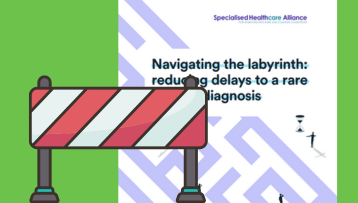Rare Disease Day is an annual,
awareness-raising event co-ordinated by EURORDIS at the international level and
RD-UK at the UK level. The main objective of Rare Disease Day is to raise
awareness amongst the general public and decision-makers about rare diseases and
their impact on patients’ lives. With
all 4 nations due to publish their plans for implementation of the UK Strategy
for Rare Diseases this week, representatives of the TSA have attended
receptions organised by RD-UK in England Scotland and Wales.
ENGLAND:
Our Chairman Philip Goldenberg and CEO Jayne Spink, @Jayne451, represented the TSA at the Wesminter Parliamentary Reception which was hosted by James Palmer, Clinical Director, Specialised Services.
Whilst no concrete plans were announced for implementation of the Rare Disease Strategy, the key elements a newly published NHS England “statement of Intent” were revealed. The document sets out how NHS England will play its part in delivering the 51 commitments set out in the UK Strategy for Rare Diseases. The next stage will be the publication of England’s five-year strategy for specialised services – of which rare disease services will be an integral part.
Many attendees expressed cautious optimism that the ambitions of the rare disease strategy could be delivered in England. Key elements of the strategy include:
- Personal care plans for patients, bringing together health and care services, with more support for patients and their families;
- Support for specialist clinical centres offering better care and support;
- Better education and training for health professionals to help ensure earlier diagnosis and access to treatment;
- Promotion of the UK as a world leader in research and development in this field.
You can view the NHS England statement here:
http://www.england.nhs.uk/wp-content/uploads/2014/02/rare-dis-stat-intent.pdf
Alison Cooper, @AliCooper1970, the TSA’s new Head of Research is marking Rare Disease Day 2014 at the Royal Holloway (University of London). Royal Holloway is a leading institution in the development of novel therapies for rare diseases, including Spinal muscular atrophy, Spinal injury, Severe combined immunodeficiency (referred to as ‘child in a bubble’ disease) and Duchenne muscular dystrophy. The university has been celebrating Rare Disease Day since 2011. It is part of their wider week-long Science Festival which aims to inspire budding scientists of all ages. On the 28th the TSA will be providing an exhibition stand. Armed with promotional goodies, we will providing information on TSC and the valuable research we fund. Alison is very excited to be joined by Dr Kayleigh Dodd, from Cardiff University who is currently undertaking a Junior Fellowship funded by the TSA. Kayleigh will be bringing a poster and presentation outlining the important work going on in Cardiff as well as her ‘Who wants to be a Millionaire quiz’ on genetics. Kayleigh’s presence will certainly help bring the science of TSC alive and hopefully inspire the attendees who will be a mixture of undergraduates and A‘ level students.
SCOTLAND
The Rare Disease event at the Scottish Parliament was attended by Lynn Shields, our Scottish TSC Advisor, hosted by Bob Doris MSP for Glasgow, and speakers included Alex Neil MSP, Cabinet Secretary for Health and Well- being, and Alastair Kent OBE, Chair of Rare Disease UK.
The event was an opportunity to bring all of the stakeholders involved in rare diseases together. It was encouraging to hear Alex Neil discuss the Scottish Governments commitment to the 51 recommendations included in the Rare Disease Strategy, and future implementation plans. Alex Neil also made reference to the Route Map to the 2020 Vision for Health and Social Care in Scotland. This paper sets out a new and accelerated focus on a number of priority areas for action and can be viewed here:
http://www.scotland.gov.uk/Topics/Health/Policy/Quality-Strategy/routemap2020vision
In addition, Alex Neil highlighted a report on the rapid review for medicines from the Scottish Medicines Consortium (SMC). It’s envisaged the new system will ensure Patients’ voices are at the centre of the new drug approval process. Scotland’s systems for approving, and accessing, new medicines for use in the NHS, are to see a step change later this year.
From May 2014 patients and clinicians will be given a greater say on what new medicines are approved by the SMC for use in the NHS. The Peer Approved Clinical System (PACS), which replaces the Individual Patient treatment Request (IPTR) for using medicines not approved for regular use in the NHS, will also come into full force in May 2014.
The TSA were represented by our Adviser based in Scotland, Lynn Shields, who commented that the collective audience welcomed this news and expressed cautious optimism.
WALES
The RD UK Senedd event took place earlier in February. The event was well attended with a number of representatives from Welsh Government (WG), NHS, Pharmaceutical Companies, Support Organisations, Professor Julian Sampson and a number of his team from the Institute of Medical Genetics at Cardiff University and Wales Gene Park.
The Welsh Delivery Plan is due to be launched on Rare Disease Day, Dr Chris Jones, Deputy Chief Medical Officer presented on behalf of the Welsh Government, speaking on how this will affect patients with rare conditions in Wales.
Marie James was invited to present at the event, it was a perfect opportunity to raise TSC awareness. See her blog here
Marie spoke of the long standing association with the Institute of Medical Genetics at Cardiff University with ground breaking progress in TSC Research Developments; the need for good quality care; access to treatment and support for people with rare diseases like TSC who often face delays in diagnosis, lack of adequate healthcare and information; and of the need to develop a small number of centres of excellence for the specific rare diseases in which we already have special clinical and research expertise.
All nations will be presenting their Delivery Plans over the coming months, as these become available the TSA will publish them so you don’t miss any of the action.










































































































